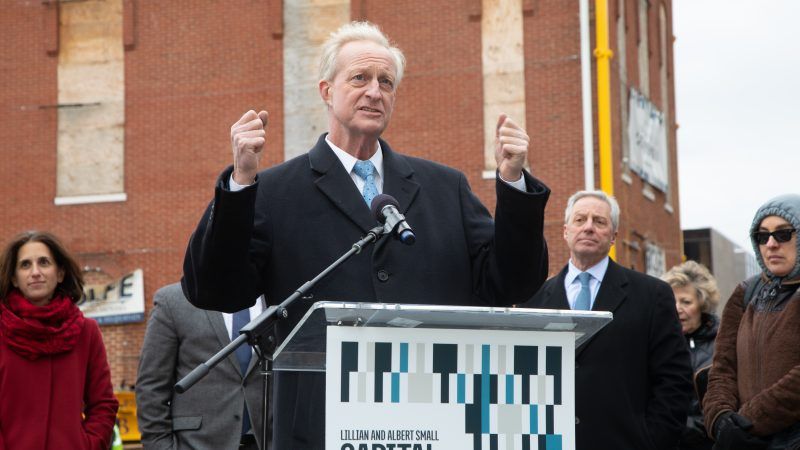D.C.'s Metro Is A Mess. Today the FBI Raided the Home of a Transit Board Member in Corruption Probe
The FBI raided the house of D.C. City Councilman and Metro board member Jack Evans as part of a federal grand jury investigation.

It's been a bad few months for the Washington Metropolitan Area Transit Authority (WMATA)—the agency in charge of the D.C. area's buses and trains—which has been wracked by falling ridership, prolonged station shutdowns, and now a federal corruption probe.
Early Friday morning, the FBI raided the Georgetown home of D.C. City Councilman and WMATA board member Jack Evans as part of a federal grand jury investigation into Evans' use of his public positions to benefit the clients of his private consulting business.
The raid comes one day after the publication of a damning legal memo—prepared by law firm Schulte, Roth, & Zabel (SRZ) as part of an internal WMATA ethics committee investigation—that accuses Evans of knowingly violating WMATA ethics rules multiple times.
That would include Forge, the parent company of parking operator Colonial Parking. According to the memo released on Thursday, Forge had been paying Evans $50,000 a year at the same time that the councilman had been demanding WMATA's Inspector General investigate rival parking company Laz.
Evans failed to disclose this conflict of interest, and continued to participate in parking-related discussions during WMATA board meetings, according to the memo. The memo also claims he failed to disclose a client relationship with a digital signage company that was looking to do business with the transit agency.
In addition, the SRZ memo found that Evans had submitted a business plan as part of a job application to a private law firm saying that he would use his connections at WMATA and the D.C. city government to help secure business for the firm.
"Our investigation uncovered a pattern of conduct in which Evans attempted to and did help his friends and clients and served their interests, rather than the interests of WMATA," concludes the SRZ memo, which found 16 times that Evans had violated WMATA ethics rules.
As recently as Tuesday Evans was asserting that he had been completely cleared by the ethics board, which had closed its investigation into Evans in early May. Three of four board members disputed this, saying they had found Evans was guilty of at least one violation.
It's difficult to know for sure because the ethics board meets in closed-door sessions and did not record minutes. Nor did the board put its findings against Evans in writing, apparently on the advice of Evans' lawyer who said that wouldn't be necessary.
The ethics committee has also said it would not be releasing a final report on its investigation of Evans because it had been advised that any such report could later be used to support a lawsuit against the transit agency, according to comments made to the Washington Post.
WMATA's ethics committee initially refused to release the results of its probe. Only written demands from Maryland Gov. Larry Hogan and Virginia Gov. Ralph Northam were enough to secure the release of the memo.
Evans is also currently the subject of a D.C. City Council ethics investigation as well.
Washington Post correspondent Robert McCarthy has called WMATA's investigation into Evans "laughable" and "surreal." Stalwart transportation watchdog Unsuckdcmetro had a particularly on-brand response to the farce.
— ???????????????????????? ???????? ???????????????????? (@unsuckdcmetro) June 20, 2019
The whole ordeal is particularly troubling given the depths of the difficulties facing D.C.'s transit system, particularly its rail network.
In March WMATA released data showing that ridership on its rail system had fallen by over 20 percent from 2009 levels. Current ridership is lower now than at any time since 2001, despite the D.C. metro area having about 1.5 million more people.
WMATA is also in the middle of a massive rebuild of some 20 separate rail platforms. The construction work has already led to the closure of several stations for the entire summer.
Even with competent stewardship, addressing years of ridership declines and the consequences of deferred maintenance would be a challenge for WMATA. If the allegations of board-level corruption prove true, that task will be all but impossible.
Rent Free is a weekly newsletter from Christian Britschgi on urbanism and the fight for less regulation, more housing, more property rights, and more freedom in America's cities.


Show Comments (12)